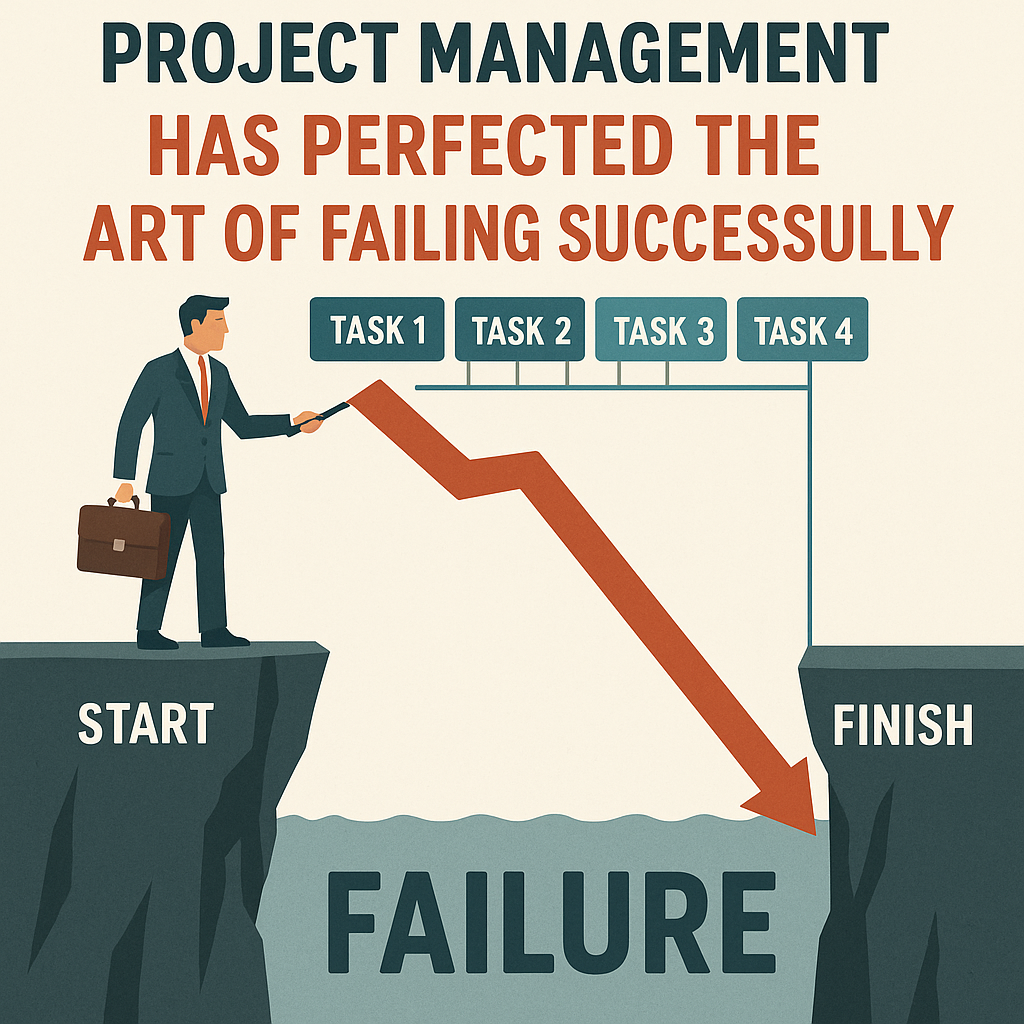Part 3: Leading Beyond Process:

How Traditional Project Management Has Perfected the Art of Failing Successfully
Traditional project management has perfected the art of failing successfully.
Think about that for a moment. We've created systems so focused on process compliance that they can deliver complete failures while celebrating success. Green dashboards. Met deadlines. Stayed on budget. Followed every procedure. And yet the thing we built? Nobody wants it. Nobody uses it. It solves yesterday's problem while today's opportunity walks out the door.
This isn't about projects that obviously went wrong. Those are easy to spot and fix. This is about something far more insidious: projects that go "right" according to our systems while going completely wrong according to reality.
The Success Paradox
"The real problem is not that we're doing the project wrong, but that we're doing the wrong project right." - Unknown
How many times have you seen this play out? The team delivers exactly what was specified, on time and on budget. The project manager gets promoted. The stakeholders sign off. Everyone celebrates.
And then... nothing. The solution sits unused. Customers complain it doesn't solve their actual problem. Sales teams can't sell it because it doesn't address real market needs. The "successful" project becomes shelf-ware.
Traditional project management optimizes for predictability and control, not for value and outcomes. It measures success by adherence to plan rather than achievement of purpose. As Peter Drucker observed, "There is nothing quite so useless as doing with great efficiency something that should not be done at all."
The Wrong Optimization Game
"We trained hard, but it seemed that every time we were beginning to form up into teams, we would be reorganized. I was to learn later in life that we tend to meet any new situation by reorganizing; and a wonderful method it can be for creating the illusion of progress while producing confusion, inefficiency, and demoralization." - Attributed to Petronius Arbiter, 1st Century AD
This ancient observation perfectly captures modern project management's fundamental flaw: confusing activity with achievement, process with progress.
Traditional PM systems optimize for:
- Predictable timelines instead of valuable outcomes
- Resource utilization instead of solution effectiveness
- Risk mitigation instead of opportunity capture
- Process compliance instead of customer satisfaction
The result? We become incredibly efficient at building the wrong things. We perfect our ability to deliver solutions that technically meet specifications while completely missing the mark on what actually matters.
The Feature Factory Trap
"A feature is not a benefit. A benefit is what the customer gets from the feature." - Marketing wisdom
Traditional project management turns organizations into feature factories. We optimize for output - how many features shipped, how many requirements met, how many tasks completed. We rarely optimize for outcome - did we solve the real problem, create genuine value, or improve people's lives?
The project plan becomes gospel, even when reality provides better information. Market research that contradicts our assumptions gets ignored because "we're already committed to the roadmap." Customer feedback that suggests a pivot gets dismissed because "it's not in scope." Better solutions get rejected because they weren't in the original plan.
As Mike Tyson famously said, "Everyone has a plan until they get punched in the mouth." Traditional project management pretends everyone has forgotten how to make a fist.
The Human Cost of Process Worship
"The way to get started is to quit talking and begin doing." - Walt Disney
But traditional project management does the opposite. It prioritizes talking about doing over actually doing. Planning about planning over actual planning. Meeting about meetings over real work.
The human cost is devastating:
Talented people become task executors. Their expertise, judgment, and creativity get subordinated to process compliance. They stop suggesting better approaches because they've learned those suggestions don't matter - only following the plan matters.
Teams lose ownership of outcomes. When success is defined as "completing assigned tasks," people stop caring whether those tasks actually contribute to something meaningful. Why invest emotionally in outcomes you can't influence?
Innovation dies in committee. Good ideas get killed by process gates designed for predictability, not possibility. The very systems meant to ensure success systematically eliminate the unpredictable elements that create breakthrough results.
As Maya Angelou noted, "If you don't like something, change it. If you can't change it, change your attitude." Traditional project management teaches people they can't change anything, so they change their attitude - from engaged to compliant, from innovative to dutiful, from owners to renters of their own work.
The Measurement Trap
"What gets measured gets done." - Management axiom
True. But what if you're measuring the wrong things?
Traditional project management measures:
- Tasks completed (not value delivered)
- Deadlines met (not problems solved)
- Budgets met (not outcomes achieved)
- Processes followed (not results created)
These metrics create a dangerous illusion: you can have perfect scores on all your measurements while delivering complete failure to your customers, stakeholders, and organization.
It's like optimizing a sports team for "showing up to practice on time" instead of "winning games." You can have perfect attendance and lose every match.
The Real Success Question
"The important thing is not to stop questioning." - Albert Einstein
Traditional project management stops questioning once the plan is approved. But the real world keeps changing, providing new information, revealing better approaches, and shifting priorities.
The fundamental question isn't "Are we following the plan?"
It's "Are we creating value?"
Not "Did we complete the requirements?"
But "Did we solve the real problem?"
Not "Are we on schedule?"
But "Are we building something people actually want?"
Traditional project management has trained us to ask the wrong questions and celebrate the wrong answers. We've become experts at failing successfully, masters of delivering precisely what nobody needs, exactly when they no longer need it.
The Path Forward
The good news? There's a better way. But it requires abandoning our addiction to false certainty and embracing a fundamentally different approach - one that optimizes for outcomes over outputs, value over compliance, and leadership over management.
That's what we'll explore in Part 4: the Leader-Leader alternative that actually delivers what traditional project management only promises.
This is Part 3 of "Leading Beyond Process." Read Part 1 and Part 2.




